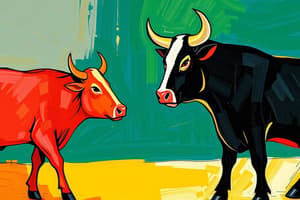Podcast
Questions and Answers
What are the four characteristics of Pure Competition?
What are the four characteristics of Pure Competition?
What happens in a market with a large number of sellers?
What happens in a market with a large number of sellers?
Each seller is independent and has perfect information.
What does a standardized product mean?
What does a standardized product mean?
Products are the same across sellers.
What is meant by freedom of entry and exit in a market?
What is meant by freedom of entry and exit in a market?
Signup and view all the answers
What are price takers?
What are price takers?
Signup and view all the answers
What is the demand curve for a firm in a Pure Competition structure?
What is the demand curve for a firm in a Pure Competition structure?
Signup and view all the answers
What is the relationship between price, marginal revenue, and demand in a Pure Competition Structure?
What is the relationship between price, marginal revenue, and demand in a Pure Competition Structure?
Signup and view all the answers
What does profit maximization in Pure Competition entail?
What does profit maximization in Pure Competition entail?
Signup and view all the answers
What is indicated by short-run profit maximization?
What is indicated by short-run profit maximization?
Signup and view all the answers
What are short-run losses?
What are short-run losses?
Signup and view all the answers
What should firms consider when facing losses but remaining open?
What should firms consider when facing losses but remaining open?
Signup and view all the answers
Under what condition should a firm shut down?
Under what condition should a firm shut down?
Signup and view all the answers
What role does a monopolist play in the market?
What role does a monopolist play in the market?
Signup and view all the answers
How is the demand curve characterized in a pure monopoly?
How is the demand curve characterized in a pure monopoly?
Signup and view all the answers
What are the two steps to regulating a monopoly?
What are the two steps to regulating a monopoly?
Signup and view all the answers
How is profit maximization represented graphically in Pure Competition?
How is profit maximization represented graphically in Pure Competition?
Signup and view all the answers
In what market structure do marginal revenue and product price equal each other?
In what market structure do marginal revenue and product price equal each other?
Signup and view all the answers
What happens when average total cost intersects with marginal cost and marginal revenue at the same point?
What happens when average total cost intersects with marginal cost and marginal revenue at the same point?
Signup and view all the answers
What occurs when a purely competitive firm is in long-run equilibrium?
What occurs when a purely competitive firm is in long-run equilibrium?
Signup and view all the answers
What does the marginal revenue of a firm equate to in pure competition?
What does the marginal revenue of a firm equate to in pure competition?
Signup and view all the answers
What do firms seek to maximize?
What do firms seek to maximize?
Signup and view all the answers
In the short run, how does a purely competitive firm maximize profit?
In the short run, how does a purely competitive firm maximize profit?
Signup and view all the answers
Study Notes
Pure Competition Characteristics
- Large number of sellers leads to independence and perfect information among competitors.
- Products are standardized, making consumers indifferent; they seek the lowest price with no brand loyalty.
- Freedom of entry and exit allows firms to enter or leave the market freely based on their desires.
- Price takers exist due to the vast number of sellers; individual firms cannot influence pricing, as the market dictates it.
Demand Curve and Revenue
- The demand curve within pure competition is perfectly elastic, indicating that firms can sell as much as they desire at the market price.
- In a pure competition structure, price equals demand (P = D) and marginal revenue (MR), reflecting a balance in market dynamics.
Profit Maximization
- Profit maximization occurs where the difference between total revenue and total cost is maximized, identified by the condition MC = MR.
- Short-run profit maximization exists when average costs (AC) are below the demand curve, indicating potential profits.
Short-Run Outcomes
- Profits are maximized at the intersection of marginal cost and marginal revenue. The quantity where AC intersects demand defines potential profits.
- Short-run losses arise when average costs exceed the demand curve, leading to a situation where costs are higher than prices.
Shutdown Conditions
- Firms may choose to remain open even during losses if average variable costs (AVC) are below the demand curve (P > AVC).
- A firm should close if its AVC is above the demand curve (P < AVC).
Monopoly Characteristics
- Monopolists act as price makers, controlling both the quantity of goods sold and the price, making the market equivalent to the firm.
- In pure monopoly, the demand curve is inelastic and downward sloping, with marginal revenue falling below demand allowing for potential excess pricing.
Regulation of Monopolies
- Regulation aims to improve monopolistic efficiency and find a compromise where prices are reduced but still above average costs.
Graphical Representation in Pure Competition
- Graphically, profits are maximized at the greatest distance between total revenue and total cost curves.
- In pure competition, marginal revenue equals product price, ensuring a direct correlation between the two.
Long-Run Equilibrium
- A purely competitive firm achieves long-run equilibrium when marginal revenue equals marginal cost, price equals marginal cost, and total revenue aligns with total cost.
- The condition of minimum average total cost equaling price indicates an efficient allocation of resources.
Firm Objectives
- Firms aim to maximize total profit, seeking the highest total revenue in relation to total costs.
- In the short run, a competitive firm will produce at a level that maximizes the difference between total revenue and total costs.
Studying That Suits You
Use AI to generate personalized quizzes and flashcards to suit your learning preferences.
Description
Explore the key concepts of market structures with our flashcards on Pure Competition and Monopoly. Learn the four characteristics that define pure competition and understand the nuances that set it apart from monopoly. Perfect for students looking to ace their economics exams.



